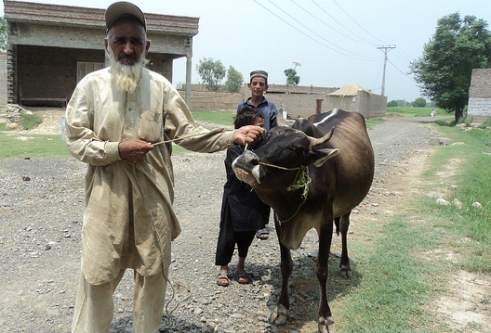By Navdha Malhotra
It is one year since the devastating flooding in Pakistan which affected 20 million people and killed over 3,000. Even now though, the country is struggling to recover and the monsoon season is fast approaching.
Although relief efforts are ongoing, they still haven’t reached many remote villages. Noor Ul Hadi, 55 from Nowshera, is the president of his older people’s association, which HelpAge set up to support older people after the floods.
Reconstruction is slow
He says: “After the floods, our lives were miserable. People were homeless and with such huge damage to our livelihoods, people became helpless. NGOs have provided psychological support, financial assistance and rehabilitation activities.
“But the process of reconstruction is very slow. In Pakistan, there is a lot corruption at the local political level. We have received a lot, but many people’s basic needs haven’t been met. People are suffering from various diseases; health and nutrition are the biggest concerns.”
Malnutrition is also a major issue in Sindh and Punjab provinces which are poorer than many other areas.
“As the floods disrupted the harvest process and destroyed crops, food prices have increased tremendously. This means that families need to buy food on credit or take out informal loans at high interest rates. Buying daily necessities like sugar is becoming out of reach for many”, says Zeeshan Alvi, Advocacy and Communications officer at HelpAge in Pakistan.
“With the month of Ramadan coming up, there is an urgent need to support older people who will be fasting. They can’t afford an appropriate diet which makes them more vulnerable to diseases and other health conditions,” adds Zeeshan.
Older people most vulnerable group
Health problems, mobility issues and dependence on family members make older people the most vulnerable group during disasters. A lack of planning and aid agencies’ limited awareness of older people’s specific needs means they are often left out of relief and distribution efforts.
Since the floods, HelpAge and our partners have been working to help older people recover from the disaster. This includes supporting them to rebuild their homes and livelihoods as well as accessing government and NGO services.
Over the last 12 months, our work with Merlin has provided 180,000 older people with health services. With Merlin and the Ministry of Health, we ensured that 17 health centres provided free consultations, eye care, counselling and health education to older people.
Raising awareness of older people’s needs
We have also established 20 older people’s associations. Through these associations we have provided cash grants to 1,200 older people and their families to buy food, repair houses, pay off loans, start small businesses and replace tools or livestock lost in the floods.
Older people’s associations have also given older people a platform to speak out about the issues they face. As a result, the government is more aware of the challenges older people face and has begun to make some budgetary allocations to them.
Tackling isolation
One of the main issues older people, especially those with mobility problems, face is isolation. To tackle this, we have distributed mobility aids – especially crutches and wheelchairs – to enable older people to become active again.
The winters in Pakistan can be bitter. To help older people cope with the cold, we distributed 12,000 cold weather kits in Nowshera and Sindh that contain blankets, shawls and other woolen clothing for older people. We have also given out 1,200 personal kits, which include items such as bedding, torches and food.
Older people are moving on from the hardship caused by the floods. With the monsoon season approaching, we are giving older people training, including education on safe havens, search and rescue and prioritising the injured for medical care, so they are better prepared if disaster strikes again.
Pakistan flood in pictures
